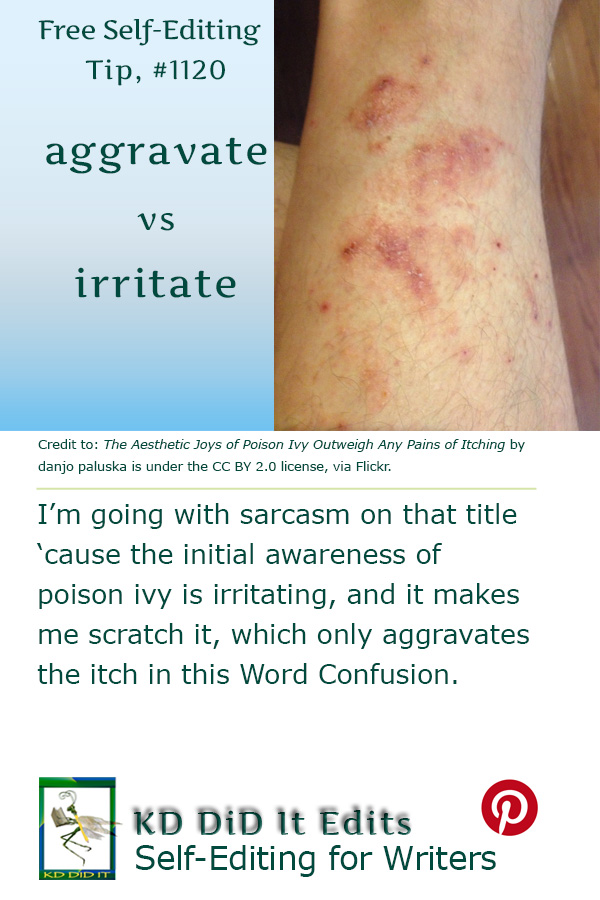As a word confusion, aggravate vs irritate, both mean to annoy. The difference is that by 1870 the use of aggravate to mean irritate had begun to change, and currently, using these words interchangeably is acceptable in conversation and casual writing. If writing formally, be careful of the differences.
Today, aggravate makes something worse. Heck it was a mosquito bite that irritated me and was aggravated by my scratching at it so much.
To irritate is to cause to become inflamed. It’s the initial start of something that provokes, vexes, gets to you, drives you bananas . . . you get the idea *grin*. It’s when that initial provocation continues, then it’s aggravating!
One example kept cropping up: aggravated assault. It’s not simply assault, but “aggravated”. Even worse than the usual type of assault. If someone were to come at me about an irritated assault, I suspect I’d be thinking mosquitoes dive bombing my skin.
This comment from StoneyB-on-hiatus cracked me up: “I, on the other hand, find that my irritation was aggravated by this latest instance” per the Stack Exchange back in September 2012.
Bottom line? “Use aggravate only to refer to a worsening of one’s irritation” (amastyleinsider).
Exploring Later . . .
You may want to explore “Aggravate versus Annoy” as well.
Word Confusions . . .
. . . started as my way of dealing with a professional frustration with properly spelled words that were out of context in manuscripts I was editing as well as books I was reviewing. It evolved into a sharing of information with y’all. I’m hoping you’ll share with us words that have been a bête noire for you from either end.
If you found this post on “Aggravate versus Irritate” interesting, consider subscribing to KD Did It, if you’d like to track this post for future updates.
| Aggravate | Irritate |
|---|---|
 |
 — |
| Part of Grammar: | |
| Verb, transitive
Third person present verb: aggravates |
Verb, intransitive & transitive
Third person present verb: irritates |
| Make something worse
Make a problem, injury, or offense worse or more serious
[Informal] Annoy, irritate, or exasperate someone, especially persistently To cause to become irritated or inflamed |
Disturb a person or a body — either physically or psychologically
Verb, intransitive: Make (someone) annoyed, impatient, or angry Verb, transitive:
|
| Examples: | |
| Putin’s nuclear threats aggravate the situation.
The child’s whining aggravated me The smoky room aggravated her asthma. She was aggravated by the constant questions. His refusal to clean up his room aggravates his mother. His bad temper aggravated the situation. All that smoking only aggravates her COPD. |
Verb, intransitive: His voice tends to irritate. Her incessant chatter irritates. My stomach is irritated. And it’ll make me pay. Verb, transitive: The children’s chatter irritated him. This laundry soap irritates my skin. The smoke irritated my eyes. |
| Derivatives: | |
| Adjective: aggravated, aggravating, aggravative Adverb: aggravatingly Noun: aggravating, aggravation, aggravator Verb, transitive: overaggravate, overaggravated, overaggravating, preaggravate, preaggravated, preaggravating, reaggravate, reaggravated, reaggravating |
Adjective: irritable, irritated, irritating, irritative Adverb: irritably, irritatedly Noun: irritability, irritableness, irritating, irritation, irritator |
| History of the Word: | |
| Mid-16th century, from the Latin aggravat- meaning made heavy, from the verb aggravare, which is from ad- (expressing increase) + gravis heavy.
Aggravate in the sense annoy or exasperate dates back to the 17th century and has been so used by respected writers ever since. |
Mid-16th century, in the sense excite, provoke, from the Latin irritat- (irritated), from the verb irritare. |
C’mon, get it out of your system, bitch, whine, moan . . . which words are your pet peeves? Also, please note that I try to be as accurate as I can, but mistakes happen or I miss something. Email me if you find errors, so I can fix them . . . and we’ll all benefit!
Satisfy your curiosity about other Word Confusions on its homepage or more generally explore the index of self-editing posts. You may also want to explore Book Layout & Formatting Ideas, Formatting Tips, Grammar Explanations, Linguistics, Publishing Tips, the Properly Punctuated, Writing Ideas and Resources, and Working Your Website.
Resources for Aggravate versus Irritate
amastyleinsider. “Aggravate, Irritate.” AMA Style Insider. 28 Apr 2011, Web. 19 Oct 2022. <https://amastyleinsider.com/2011/04/28/aggravate-irritate/>.
Apple Dictionary.com
Dictionary.com: aggravate
The Free Dictionary: irritate
Pinterest Photo Credits:
The Aesthetic Joys of Poison Ivy Outweigh Any Pains of Itching by danjo paluska is under the CC BY 2.0 license, via Flickr.


